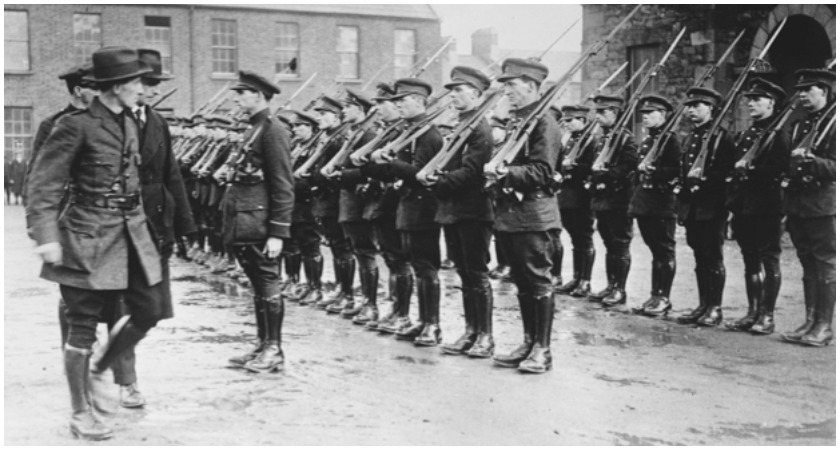IRELAND'S NATIONAL anthem, Amhrán na bhFiann, is steeped in a troubled history.
Like the other countries colonised by the powerful British Empire, for hundreds of years the Irish people had 'God Save the King/Queen' as their official national anthem.
But after numerous armed struggles over generations, after the failed rebellion in Easter 1916, after the War of Independence and the subsequent Civil War which pit brother against brother, Ireland was officially recognised as the Free State.
Things were not simple, however; there remained ex-unionists in Ireland who still recognised God Save The King as their national anthem.
And the two sides who had fought each other with such vigour in the Civil War would find it difficult to find a song which resonated with both and insulted neither.
The song which would become the Republic of Ireland's official National Anthem was Amhran na BhFiann-- although at the time, it was known as the English version, A Soldier's Song.
Written in 1910 by lyricist Peader Kearney and musician Patrick Heeney, A Soldiers' Song became an unofficial anthem for the war against Britain, telling the tale of Ireland's fight against a foreign enemy.
The Irish-language version was created some years later by Liam Ó Rinn-- this is the version which would become the anthem of the Republic.
It had been sung at the GPO during the Easter Rising, was sung by prisoners of war incarcerated for their actions in the Rising, and its lyrics were featured on future Taoiseach Éamon deValera's election banner in 1917.
During the War of Independence, A Soldier's Song was sung by Sinn Féin and the Irish Volunteers under deValera, which would later become the Irish Republican Army (IRA), and for a while the song was known as the Sinn Féin anthem.
 The War of Independence was fought between 1919 and 1921
The War of Independence was fought between 1919 and 1921Sensing dissent and an ever-growing wave of Irish nationalism, the anthem was banned by British forces, and copies of the song were confiscated and destroyed.
Despite this, A Soldier's Song grew in popularity, and even made its way over to America, where it was hugely popular in Irish-American circles; by the time Éamon deValera visited the US as the self-proclaimed President of Dáil Éireann and the Republic of Ireland in 1919, crowds sang the anthem while gathered at rallies.
Even when the sides split into pro- and anti-Treaty during the Irish Civil War, both sides continued to sing TA Soldier's Song-- and when the war was over and the Free State was won, it was eventually decided that it was the correct anthem for the newly free country.
While complications persisted, Ireland needed a new national anthem, and it was the unofficial song for 12 years, beginning in 1926.
Finally, in 1934, the Department of Finance acquired the copyright to the song for £1,200, and the Irish-language Ámhran na bhFiann became the official National Anthem of Ireland.
Of course, the complicated history does not end there-- today, the Republic and Northern Ireland play in the same team in Rugby Union matches,.
With Northern Ireland's official national anthem being God Save the Queen, and the Republic's anthem rejoicing in rejecting England and the Queen, a tentative deal had to be drawn to accommodate both the Republic, and Northern Ireland's two communities-- hence 'Ireland's Call' being the song the team stand for before each match.
The Irish national anthem, Amhrán na bhFiann:
The English-language lyrics:
A Soldier's Song
Soldiers are we
whose lives are pledged to Ireland;
Some have come
from a land beyond the wave.
Sworn to be free,
No more our ancient sire land
Shall shelter the despot or the slave.
Tonight we man the Bearna Baoil
In Erin's cause, come woe or weal
'Mid cannons' roar and rifles peal,
We'll chant a soldier's song
The Irish-language lyrics:
Amhrán na bhFiann
Sinne Fianna Fáil,
Atá faoi gheall ag Éireann,
Buíonn dár slua, thar toinn do ráinig chugainn,
Faoi mhóid bheith saor, seantír ár sinsear feasta
Ní fhágfar faoin tíorán ná faoin tráill;
Anocht a théam sa Bhearna Baoil
Le gean ar Ghaeil chun báis nó saoil,
le gunnaí scréach, trí lámhach na bpiléar,
Seo dhíbh canáigh, Amhrán na bhFiann.

